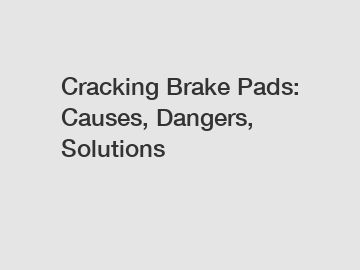Dec. 15, 2023
Transportation
Cracking Brake Pads: Causes, Dangers, Solutions.
Cracking brake pads pose a significant risk to vehicle safety as they can compromise braking efficiency and lead to potentially catastrophic consequences. Understanding the causes of brake pad cracking, the dangers it presents, and the available solutions is crucial for every car owner. In this article, we will delve into this issue, exploring the origins of brake pad cracking, discussing its implications, and presenting viable remedies to ensure optimal brake performance.
Causes:

1. Heat Stress: One of the primary reasons behind brake pad cracking is excessive heat buildup. When a vehicle frequently undergoes aggressive braking or descends steep hills, the temperature of the brake system rises significantly. This heat leads to thermal expansion and contraction, exerting stress on the brake pads, eventually resulting in cracks.
2. Overheated Rotors: Unevenly or excessively overheated rotors can also contribute to brake pad cracking. As the rotors expand and contract unevenly due to intense heat, they can cause the brake pads to crack under the added pressure.
Dangers:
1. Reduced Braking Efficiency: Cracked brake pads have reduced surface area, leading to decreased friction with the rotors. This diminished contact results in delayed response times and a longer braking distance, jeopardizing vehicle and occupant safety.
Further reading:2. Brake Fade: When brake pads are cracked, they are more prone to brake fade, a phenomenon where the brake performance deteriorates due to excessive heat. Brake fade can result in a sudden loss of braking power, leaving drivers unable to stop their vehicles promptly.
Solutions:
1. Regular Inspection and Maintenance: Routine inspections of the brake system, including the brake pads, should be performed to identify cracks or any other signs of wear. Prompt replacement of damaged pads can prevent further complications and ensure optimum braking performance.
2. Upgrading Brake Pads: Some brake pads are specifically designed to handle high heat and reduce the likelihood of cracking. Upgrading to these heat-resistant brake pads can be an effective solution for preventing cracking and maintaining optimal braking efficiency.
3. Modifying Driving Style: Aggressive braking and prolonged downhill driving should be avoided to minimize excessive heat buildup in the brake system. Using engine braking techniques, like downshifting, can help distribute heat evenly and alleviate stress on the brake pads.
In conclusion, brake pad cracking is a serious issue that compromises braking performance, thus jeopardizing vehicle safety. By understanding the causes behind it and implementing the recommended solutions, car owners can mitigate the risks associated with cracked brake pads. Regular inspections, upgrading to heat-resistant brake pads, and modifying driving habits are crucial steps towards ensuring reliable and efficient braking, ultimately enhancing overall road safety.
Are you interested in learning more about Ceramic Brake Pad Wholesale, Brake Pad Manufacturer, semi metallic brake pad supplier? Contact us today to secure an expert consultation!
Further reading:Related Articles
If you are interested in sending in a Guest Blogger Submission,welcome to write for us!
All Comments ( 0 )